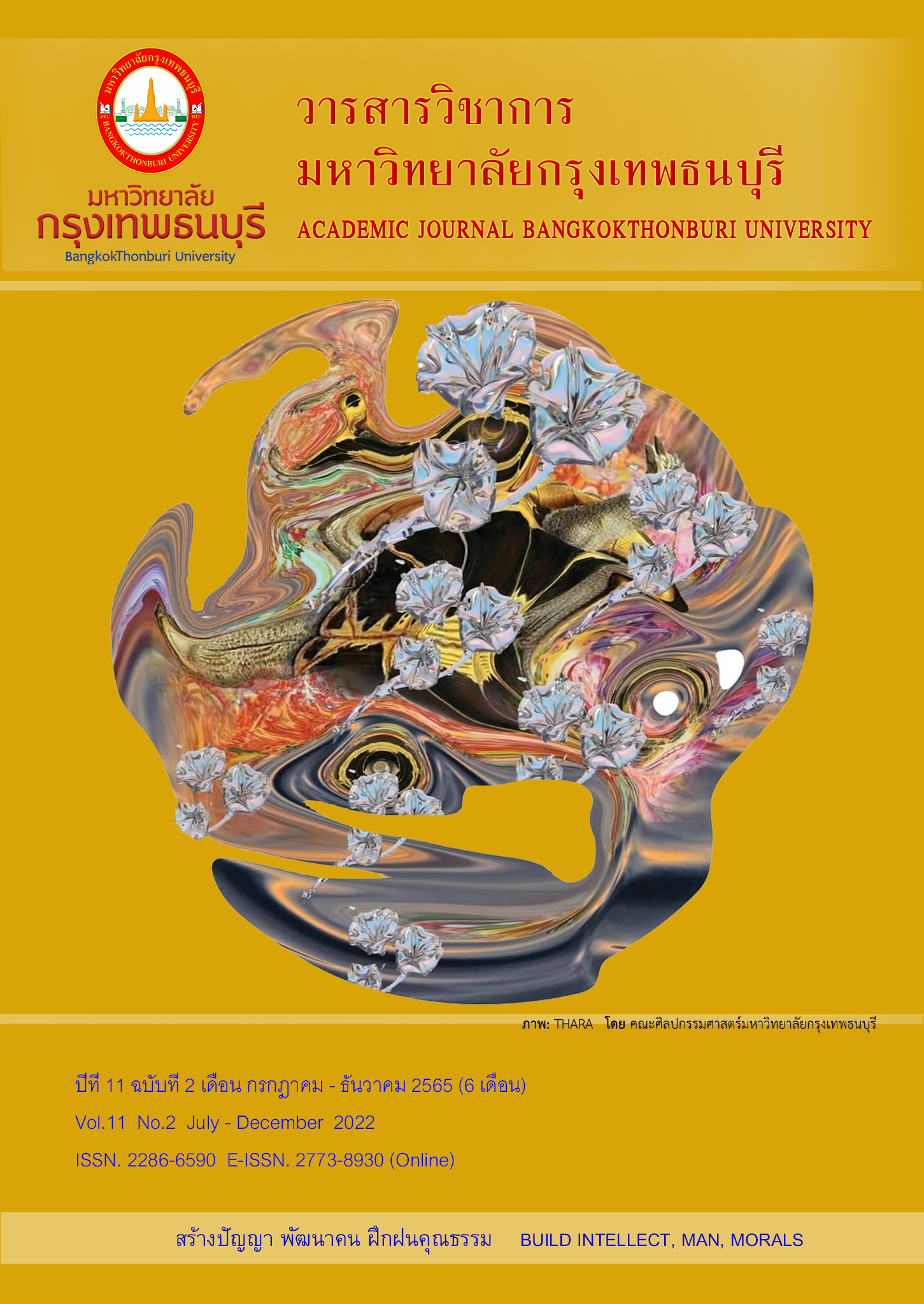Effective Online Teaching and Learning Management Using Massive Open Online (Mooc) Platform of Thai Universities
Main Article Content
Abstract
Education in a knowledge-based society through social media is a society that uses a high level of knowledge or technology. Therefore, massive open online (MOOC) is an education in the form of online teaching and learning management that allows students to learn a lot via the website, both free and paid. New education innovation of the world. The objectives of this research were: 1) to study the current situation, problems of massive open online (MOOC) in Thailand Universities. 2) To study the needs for self-development of massive open online (MOOC) in Thailand universities. The research results that the current situation has problems with the management of massive open online (MOOC) in Thailand universities with the terms of developing higher education professional instructors for effective online teaching and learning management of massive open online (MOOC). It consists of 5 important factors as follows: 1) Instructional Management 2) Teaching and Learning Curriculum Design both learning content structure Format of teaching materials learning activities design Evaluation and Quality Assurance 3) Continuous development and improvement to support a large number of learners requires assessment for improvement 4) Applicability: MOOC courses are used appropriately in the context of Thailand education, and 5) the aspect of assessment to be a standard that is jointly set by various institutions so that learners can study with the same standards. While the research results on the self-improvement needs of instructors of the massive open online (MOOC) in Thailand universities. The main findings were: 1) the need for self-development in curriculum design, 2) self-development in effective of massive open online (MOOC), 3) the development of skills, techniques, teaching methods through in-house training and cooperation in professional development from outside the institute, and 4) self-development in using technology appropriately and consistency of the content.
Article Details

This work is licensed under a Creative Commons Attribution-NonCommercial-NoDerivatives 4.0 International License.
References
จินตวีร์ คล้ายสังข์. (2556). MOOCs PEDAGOGY: จาก OCW, OER สู่ MOO เครื่องมือเพื่อการเรียนรู้สําหรับผู้เรียนยุคดิจิทัล. การประชุมวิชาการระดับชาติด้านอีเลิร์นนิง ปี พ.ศ. 2556. 276-285.
ใจทิพย์ ณ สงขลา. (2550). E-Instructional Designวิธีวิทยาการออกแบบการเรียนการสอนอิเล็กทรอนิกส์. กรุงเทพมหานคร: ศูนย์ตำราและเอกสารทางวิชาการ คณะครุศาสตร์ จุฬาลงกรณ์มหาวิทยาลัย.
จุฬาลงกรณ์มหาวิทยาลัย (2563). Chula MOOC. กรุงเทพฯ., สืบค้นจาก https://mooc.chula.ac.th/
ฐาปนีย์ ธรรมเมธา และคณะ (2561).แนวทางการพัฒนาอาจารย์เพื่อเตรียมความพร้อมในการสอนออนไลน์แบบเปิดสำหรับมวลชน.โครงการมหาวิทยาลัยไซเบอร์ไทย สำนักงานคณะกรรมการการอุดมศึกษา.
เดชา เดชะวัฒน์ไพศาล (2563).การเปลี่ยนแปลงและความท้าทายในการบริหารทรัพยากรมนุษย์ยุคใหม่.CHULA MOOC, กรุงเทพฯ, สืบค้นจาก mycourseeville.com.
ณฐภัทร ติณเวส และฐาปนีย์ ธรรมเมธา. (2559). การศึกษารูปแบบการจัดการศึกษาระบบเปิดแบบ MOOC ของอุดมศึกษาไทย. Veridian E-Journal, Silpakorn University, 9(3), 1463-1497.
ธานินทร์ อินทรวิเศษ และคณะ (2562). เทคโนโลยีและนวัตกรรมกับการจัดการเรียนการสอนในยุคดิจิทัล.Veridian E-Journal, Silpakorn University, 12(6),1906-3431.
ไพฑูรย์ สินลารัตน์ (2554). หลักและเทคนิคการสอนระดับอุดมศึกษา.พิมพ์ครั้งที่ 3, กรุงเทพฯ, มหาวิทยาลัยธุรกิจบัณฑิต, พิมพ์ที่โรงพิมพ์จุฬาลงกรณ์มหาวิทยาลัย.
มหาวิทยาลัยไซเบอร์ไทย. (2563). ความเป็นมา Thai MOOC. สืบค้นเมื่อ 20 เมษายน 2563 จาก http://mooc. thaicyberu. go.th/about-us/#.X6Vdg2gzbIU.
สำนักงานคณะกรรมการการอุดมศึกษา. (2561). แผนอุดมศึกษาระยะยาว 20 ปี พ.ศ. 2561 - 2580. สำนักนโยบายและแผนการอุดมศึกษา, กรุงเทพฯ: บริษัทพริกหวานกราฟฟิกจำกัด.
สำนักงานคณะกรรมการการอุดมศึกษา. (2561). แนวทางการพัฒนาอาจารย์เพื่อเตรียมความพร้อมในการสอนออนไลน์แบบเปิดสำหรับมวลชน.โครงการมหาวิทยาลัยไซเบอร์ไทย, สืบค้นเมื่อ 20 กันยายน 2563 จาก http://support.thaicyberu.go.th/research/teacherWithMOOC.pdf.
Anthony G. (2016). Online education policy and practice: the past, present, and future of the digital university Picciano, New York. Retrieved from https://www.researchgate .net/publication/314197512.
Ahmed, O. J. (2019). Online Course (MOOCs) to Revolutionize Technology in Education: A Case of Pakistan. Journal of Education and Educational Development. 6(2).
Baran, E., & Correia, A.-P. (2014). A Professional Development Framework for Online Teaching. Tech Trends, 58(5), 96-102.
Chen Chen. et al. (2020). Going over the cliff: MOOC dropout behavior at chapter transition. Journal Distance Education, 41(1), 6-25., Retrieved from https://www. tandfonline.com/doi/abs/10.1080/ 0158 7919. 2020.1724770.
Ke Zhang. et al. (2019). MOOCs and open education in the Global South: Challenges, successes, and opportunities., New York, Routledge, 2019, 392 pp., Retrieved from https://doi.org/10.4324/ 9780429398919.
Min Young Doo, et. al. (2020). MOOC instructor motivation and career development. Journal Distance Education, 41(1), 26-47., Retrieved from https://www.tandfonline. com/doi/abs/10.1080/01587919. 2020.1724770.
Shannon Skecher, et al. (2020). Connecting online students to their higher learning institution, Distance Education, 41(1), 128-147, Retrieved from https://www.tandfonline.com/ doi/full/10.1080/01587919.2020.1724771.


